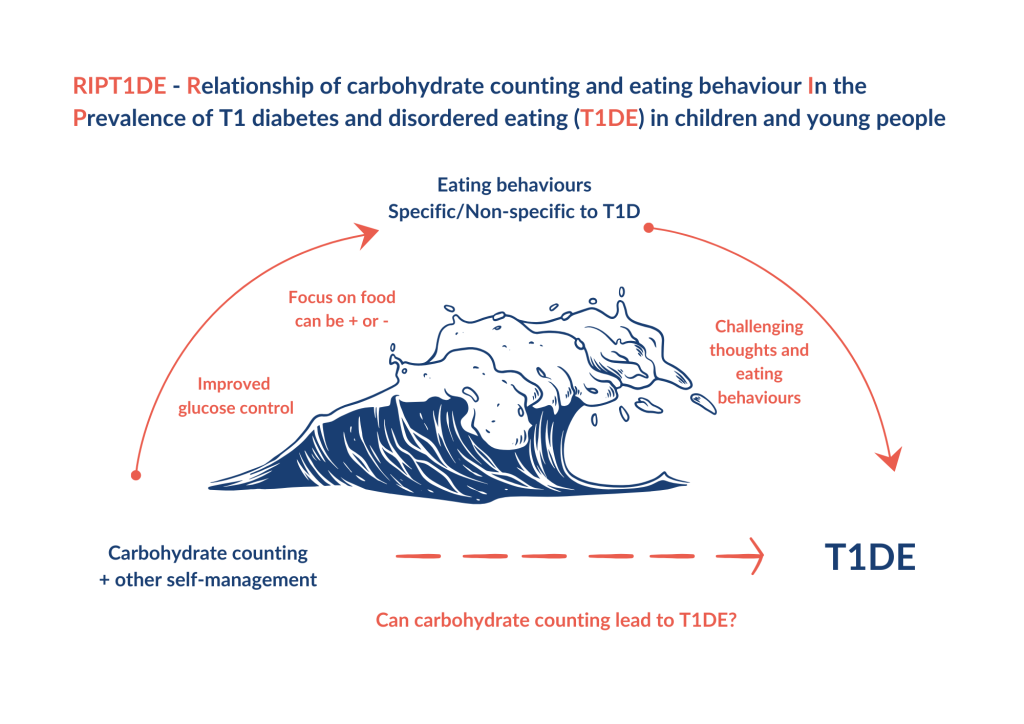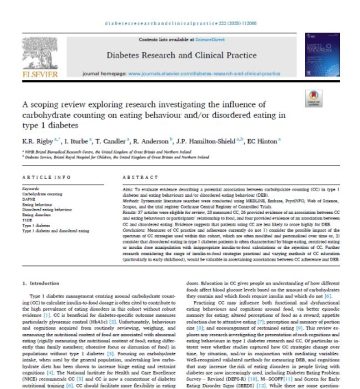Carbohydrate counting and risk of disordered eating in young people with type 1 diabetes
Theme Diet and physical activity
Workstream Clinical diet and physical activity
Status: This project is ongoing
Young people living with type 1 diabetes have a higher risk of developing disordered eating when compared to their peers living without the condition. Disordered eating is difficult to manage in someone with type 1 diabetes because it must be treated in specialist units that treat both the eating behaviour and any complications associated with diabetes.
The UK doesn’t currently offer specialised services for children and young people affected by disordered eating while living with diabetes. Understanding and preventing disordered eating among this patient group should be a priority.

A person living with type 1 diabetes usually manages their condition by calculating the carbohydrate content of a meal and adjusting their insulin dose accordingly. This is called carbohydrate counting. Carbohydrate counting is complex, and fixating on the nutritional value of food may contribute to disordered eating.
Our understanding of eating and food choice comes from researching the psychological aspects of eating behaviour, such as:
- portion size
- food reward
- memory for recent eating
- restraint
Applying this research to young people with type 1 diabetes may improve our understanding of the potential positive and negative impact of carbohydrate counting.
Project aims
We would like to understand how best to identify young people at risk of developing negative behaviours around food and eating, before they start carbohydrate counting for themselves. Carbohydrate counting often starts in adolescence, when the risk for developing eating disorders is also at its highest. We hope that intervening at this stage would prevent young people from developing disordered eating.
We want to:
- understand barriers affecting eating behaviours and adherence to carbohydrate counting
- find ways of understanding and assessing adherence to and adaption of carbohydrate counting
- explore reasons why people might restrict/omit insulin doses or restrict/binge on food
- define risks for developing disordered eating when living with type 1 diabetes
Our work so far
We reviewed past research into links between carbohydrate counting and disordered eating.
37 research papers were included in the review. Of the 70% of articles that measured carbohydrate counting and eating behaviours:
- 39% found that carbohydrate counting influenced eating more or less of specific foods or food groups
- 29% found it impacted perceptions of dietary flexibility
- 14% found it influenced perceptions of dietary restriction
- 18% found it changed peoples’ perception of food
Of the 28% of articles that measured carbohydrate counting and disordered eating behaviours, 50% found a link between the two. People who used carbohydrate counting were less likely to exhibit disordered eating behaviours.
However, we also found that studies looking at the link between carbohydrate counting and eating disorders did not adequately measure carbohydrate counting behaviours.
Studies also failed to consider that type 1 diabetes and disordered eating, known as T1DE, is often characterised by restricted eating, taking inappropriate doses of insulin and/or rejecting carbohydrate counting.
The review suggests that future research on this topic needs to consider:
- How and when people with type 1 diabetes start carbohydrate counting, especially those with early-onset type 1 diabetes
- The different ways people with type 1 diabetes determine insulin dose and/or calculate the carbohydrate in food
- The way people with type 1 diabetes think about food
- Past and present exposure to, and use of carbohydrate counting, including reasons for adapting and/or rejecting strict carbohydrate counting
What we hope to achieve
We hope to increase our understanding of the relationships between carbohydrate counting, the psychological aspects of eating behaviour and the risk of disordered eating.
This research will pave the way to developing a new tool for assessing the risk of developing an eating disorder while living with type 1 diabetes. We will then use this new tool to develop a behaviour change intervention aimed at preventing negative beliefs/attitudes and associations that can start before a clinical eating disorder develops.
This research is part of a PhD project. It is being led by Karen Rigby with supervision from Dr Elanor Hinton, Professor Julian Hamilton-Shield, Dr Toby Candler and Dr Rosie Anderson.
